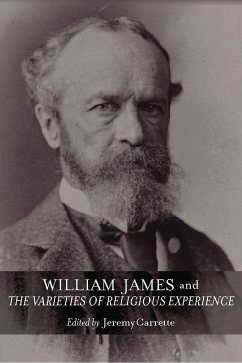
The Varieties of Religious Experience
A Study in Human Nature
Versandkostenfrei!
Versandfertig in 1-2 Wochen
19,99 €
inkl. MwSt.

PAYBACK Punkte
10 °P sammeln!
The Varieties of Religious Experience: A Study in Human Nature *is a book by the Harvard psychologist and philosopher William James comprising 20 lectures given at the University of Edinburgh in Scotland. These lectures concerned the nature of religion and the neglect of science, in James' view, in the academic study of religion. Soon after its publication, the book found its way into the canon of psychology and philosophy, and has remained in print for over a century. James was most interested in direct religious experiences. Theology and the organizational aspects of religion were of seconda...
The Varieties of Religious Experience: A Study in Human Nature *is a book by the Harvard psychologist and philosopher William James comprising 20 lectures given at the University of Edinburgh in Scotland. These lectures concerned the nature of religion and the neglect of science, in James' view, in the academic study of religion. Soon after its publication, the book found its way into the canon of psychology and philosophy, and has remained in print for over a century. James was most interested in direct religious experiences. Theology and the organizational aspects of religion were of secondary interest. He believed that religious experiences were simply human experiences: "Religious happiness is happiness. Religious trance is trance." He believed that religious experiences can have "morbid origins" in brain pathology and can be irrational but nevertheless are largely positive. Get Your Copy Now.














